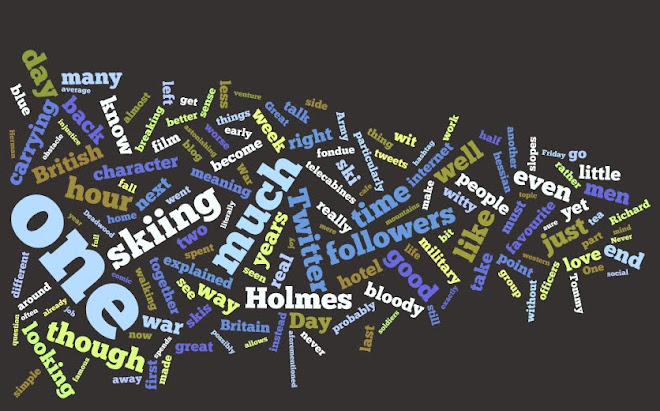Earlier this week, my favourite daily publication produced this list of top 50 television dramas and today, only a handful of days later, they were forced to publish a brief appendix of the shows they missed, most startlingly HBO's magnificent, sweary, violent tale of the Black Hills in the American West, Deadwood. There was literally an outcry, people claimed that it should be 'top 5, maybe even best ever' and that excluding Deadwood made the whole thing 'a farce', even Guardian staff member Esther Addley asked 'where is Deadwood? I fear you may be very, very wrong.' And you know what? For once the public is actually right about something. To omit Deadwood from the list and yet allow Eastenders in is a bizarre aberration and one that has led me to write today's blog post in praise of the fantastically adult, brilliantly scripted, thematically complex tale of a small mining camp and its growth into a town in the dying days of the American West.
Now, I'm not going to attempt to describe three seasons of hour long episodes to you, but what I will say is that the character development is fantastic. There's an enormous rich and varied ensemble cast, but perhaps the two protagonists are hardware store owner cum lawman Seth Bullock (Timothy Olyphant) and appropriately named saloon owner and kingpin Al Swearengen (a bravura performance by Ian McShane). Bullock has the unenviable task of bringing law to Deadwood, while Swearengen makes the successful transition over the seasons of antagonist to antihero - while Swearengen is portrayed as ruthless, amoral and canniving, he is made to look like the Pope by the arrival of George Hearst, a California prospector with highly effective 'methods' of increasing his personal fortune and you'd be hard-pressed to find any sentient creature that wouldn't line up alongside Al against "fuckin'" Hearst, as he is frequently referred to.
That convieniently brings us on to the topic of swearing. There's a shitload of profanity (see what I did there...?), indeed it was estimated that there are 43 "fucks" withing the first hour of the show and wikipedia informs me that there are a grand total of 2,980 in the entire three season run, roughly 1.56 "fuck"s a minute, if that isn't value, I don't know what is. Now public opinion has been split on the topic of swearing, some claiming it to be historically inaccurate, others that it's just plain rude. My personal take is that Deadwood achieves the same manner of free-flowing innovative dialogue as The Thick of It. There is a lot of swearing but it is done in such a clever and dare I say charming manner, that it simply washes over you without barbing the eardrums. Many of the best TV series' are self-aware and Deadwood was no different with an amusing exchange between eloquent, melodramatic hotelier E.B. Farnum and geologist Mr. Wolcott, from whom he just acquired (by less than legal means) the princely sum of 10,000 dollars.
EB: Some ancient Italian maxim fits our situation, whose particulars escape me.
Wolcott: Is the gist that I’m shit outta luck?
EB: Did they speak that way then?
A quick glance at the bbfc guidelines will tell you that it 'contains very strong language, some racist, strong violence and sex'. Now, that's every criteria for great modern drama ticked right there. Each of these add to the general sense of lawlessness and peril present in the town. The strong violence particularly befits the setting. In the Third season it reaches new heights in an out and out streetfight between Swearengen's man Dan Dority and Hearst's enforcer Captain Turner. It is as brutal a contest as you will see in any television drama and as a viewer you feel every blow and your heart pounds as you will Dan on against the man mountain Turner. Elswhere Al has his finger cut off by Hearst, numerous characters are shot (or worse) and several succumb to classic 19th century death sentences like Consumption and Brain tumours, all in visceral, emotive realism.
The show explores complex themes of 19th century racism, the destruction of individualism by unscrupulous capitalism (the prospectors being bought out and consolidated into Hearst's business), political corruption, immigration, misogyny, prostitution and perhaps most importantly bringing order to chaos through law. It is technically a period piece, but it shakes up the genre marvellously. It's a far cry from Lonesome Dove, I can tell you.
It should of course have been present on the Guardian's list for sheer unadulterated impact, quality and McShane's five-star turn as Swearengen. Other high profile omissions from the list were HBO's Rome (silly, but ultimately enjoyable), Life on Mars (one of the best British dramas of the decade, possibly any decade) and historical epic I Claudius (as mentioned in my post about the Borgias- you really should read that one by the way). They should all have had a place on the list, but well... life's a bitch, isn't it.





No comments:
Post a Comment